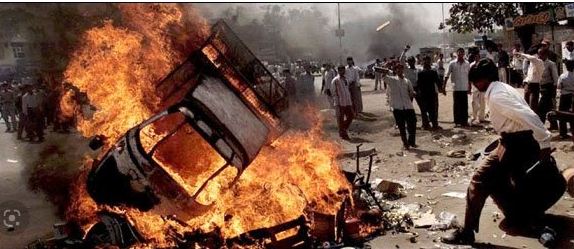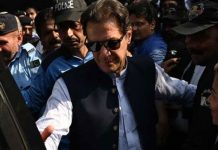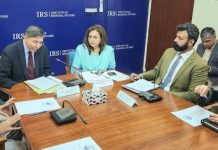The intimidation of India’s over 200 million Muslims has always been a norm in India, and Prime Minister Narendra Modi has taken it to new heights.Since his election to India’s top elected office, Modi has elevated fellow right-wing Hindu extremists to positions of power in India. The entire Indian legal and administrative machinery is blindly pursuing the Hindutva-driven agenda of the ruling BJP-RSS nexus, where perpetrators of hate and violence are protected by law and enjoy impunity; where religious minorities are constantly threatened and denied the freedom to practice their faith without fearfor their lives, property, and places of worship.
The Modi government is making relentless attempts to remould Indian democracy aimed at empowering Hindus to make them constitutionally pre-eminent, and as a consequence relegating minorities to the status of second-class citizens. The US Commission on International Religious Freedom accused New Delhi of a “crackdown on civil society and dissent”, and “religious freedom violations”.
The BJP government has repeatedly been seen making all-out efforts to cash in on its divisive policies even two decades after the horrific Gujarat massacreby seeking electoral approval of its well-orchestrated pogrom in 2002.Weeks before the recent State elections in Gujarat, the BJP government approved the premature release of 11 men convicted of rape and murder of Muslim women and children during the 2002 pogrom, a saga of appalling riots that led to the killing of over two thousand and displacement of over 200,000 Muslims.
Hundreds of young Muslim girls were sexually assaulted, tortured, and killed. In June 2022, the Supreme Court of India handed a clean chit to Modi. The Supreme Court dismissed as many as 11 petitions, including one filed by the National Human Rights Commission of India, seeking an independent probe into the 2002 Gujarat riots cases.
Though Modi has always been in denial, his party leaders have never shied away from claiming “credit” for the massacre. On November 25, while on an electoral campaign in Gujarat, Home Minister Amit Shah said Muslims were “taught a lesson” in 2002. And that:“After they were taught a lesson in 2002, these elements left that path (of violence). They refrained from indulging in violence from 2002 till 2022. BJP has established permanent peace in Gujarat by taking strict action against those who used to indulge in communal violence.”
The political dividend of this discordant electoral campaign was phenomenal. Modi’s BJP won a huge majority of 156 seats, the most ever won by any party in Gujarat’s history. The Indian National Congress fell to its lowest count in the state for 3 decades—17, and the newcomer Aam Aadmi Party bagged five seats.
“The butcher of Gujarat lives, and he is the prime minister of India,” Foreign Minister Bilawal BhuttoZardari told a UN briefing, on December 15. “He (Narendra Modi) was banned from entering this country (the US). These are the prime minister and foreign minister of RSS, which draws inspiration from Hitler’s SS,” he added.
Madhav S. Golwalkar, considered among the founders of the Hindu Nationalist movement in India — whom Modi idealises and idolises — saw Islam and Muslims as enemies. He said: “Ever since that evil day when Moslems first landed in Hindusthan, right up to the present moment, the Hindu Nation has been gallantly fighting to shake off the despoilers.” In his book “We”, Golwalkar heaped praises upon Nazi leader Adolf Hitler and his Holocaust against minoritiesand encouraged India to follow a similar path.
In 2012, a former Chief Minister of Gujarat, Mr.ShankersinhVaghela accused Modi’s state government of having blood on its hands: “The foundation of this (Modi) government rests on the 2002 carnage. Governments are made, but not on conspiracies. And the people of Gujarat know this, and that’s why we are requesting the people for a change,” Mr Vaghela had said.
Paul Richard Brass, professor emeritus of political science and international relations at the University of Washington, believes these anti-Muslim riots are not spontaneous but planned and staged as “a grisly form of dramatic production” by well-known perpetrators from the Sangh Parivar of which Modi has been an ardent member since his youth.
On November 28, The Guardian aptly commented editorially on India’s ill- treatment of its Muslim community: “New Delhi’s foreign policy won’t be insulated from its domestic politics, which demonises India’s 200 million Muslims”. In a piece captioned: “The Danger of Exporting Hindu Chauvinism”, the paper commented: “The US state department has recently told a court that India’s Narendra Modi’s failure as chief minister of Gujarat to prevent anti-Muslim riots in 2002 that left hundreds dead saw him denied entry to the US until he became Indian prime minister”.
And that “the ban had not been withdrawn, but suspended because Mr. Modi ran a country that Washington wanted to do business with”.The ban will be back once Modi is out of power. It was an indication that India could find the international community less accommodating if the RSS-BJP duo continues to stir up hatred to win elections. The West is also worried about Modi’s India exporting Hindu extremism to the Indian diaspora across the world.
The international community, particularly Human Rights entities and activists needs to take serious note of the disturbing escalation of Islamophobia in India. The United Nations needs to immediately constitute an independent Commission of Inquiry to bring the culprits of the horrific Godhra-Gujarat massacre of 2002, to justice.
Air Commodore Khalid Iqbal (Retd) is Director National Security at the Centre for Aerospace and Security Studies (CASS), Lahore, Pakistan. He can be reached at [email protected]

















